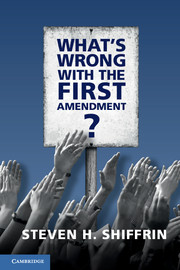Book contents
Introduction
Published online by Cambridge University Press: 05 September 2016
Summary
I have been teaching classes in the First Amendment for nearly forty years. Students love the First Amendment. Like the overwhelming majority of their fellow citizens, they celebrate not only its protection of a basic human right, but also its role as a part of their identity as Americans.
There was a time when those celebrations were justified, but I believe we have come to a point when it is thinkable that the First Amendment does more harm than good. Don't get me wrong. The First Amendment does a lot of good. At its best, freedom of speech promotes many values including liberty, freedom, equality, tolerance, respect, dignity, self-government, truth, justice, and associational values, along with cultural and communitarian values. Perhaps most important, it protects dissent, speech that criticizes existing customs, habits, traditions, institutions, and authorities. Indeed, it protects criticism of public officials and public figures to a greater extent than other countries in the world. It even protects advocacy of illegal action so long as it is not directed to incite and likely to incite and produce imminent lawless action. It could do more to protect dissent than it does and it should. I will argue in Part II of this book that the First Amendment fails to protect dissenting speech as much as it should and that its failure to protect religious minorities is even more pronounced than its failures in protecting dissent.
The main problem with the First Amendment, however, is that it overprotects speech. We take pride in protecting the speech we hate and in tolerating speech that offends. But no one justifies regulating speech on the ground that we should hate it, and regulating speech merely on the ground that it offends is a nonstarter. But speech that causes significant harm (or unreasonably risks such harm) ordinarily should be regulated to avoid the harm, and that kind of speech should not be exempted from regulation because it is also hateful or offensive.
Free speech doctrine downplays the harm that speech can cause. Indeed, its most problematic assumption is that free speech is considered to be so valuable that it almost always outweighs other values with which it comes into conflict. Of course, free speech is ordinarily valuable, but there is no good reason to assume that it invariably should outweigh other values.
- Type
- Chapter
- Information
- What's Wrong with the First Amendment , pp. 1 - 10Publisher: Cambridge University PressPrint publication year: 2016

